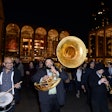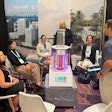“Incentive travel used to offer programming from 7 a.m. to 10 p.m. every day that was structured and group oriented,” O'Malley said. “Now people are so busy and so inundated that they need time to disconnect, and that’s what they want. Fewer structured events make it that much more motivational for them.”
“The good news for companies is that leisure time doesn’t cost anything. And that’s what they [respondents] are screaming for,” said Jim Ruszala, past president of the council and co-chair of the study. He suggests planners give attendees a list of activities and ideas on how to spend their free time so individuals can make those decisions on their own.
The survey also found that people eligible for incentive travel enjoy evening social events, but they don’t want something scheduled every night of the trip. And two out of three respondents indicated they were more motivated to try to earn a trip if they knew it would give them opportunities to interact with higher-level executives, not just their peers.
When an incentive travel program is completed, O’Malley said companies should also do a better job of communicating about it to those who won the travel opportunity and to those who did not. “It can’t just be about the big event. Once you create that very positive impression, how do you extend that experience to motivate performance and spur increased activity and loyalty?”



















